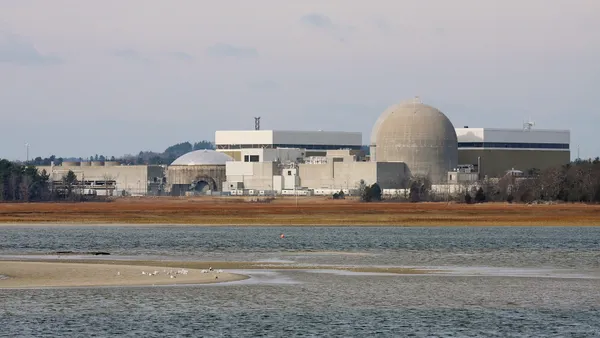Dive Brief:
- In a filing on Thursday, the U.S. General Services Administration (GSA) urged the D.C. Public Service Commission to reject the latest proposal for Exelon's $6.8 billion purchase of mid-Atlantic utility Pepco. The GSA purchases power for the federal government, the city's largest electricity consumer.
- The filing comes after the D.C. ratepayer advocate rejected Exelon and Pepco's revised proposal earlier in the week over concerns on how to allocate part of a $78 million customer investment fund (CIF) that would be set aside to protect consumers from rate increases and fund grid upgrades.
- GSA raised concerns over a $20 million portion of the CIF allocated for the Commission's discretionary use as well as the lack of consensus among the settling parties, which the agency said flies in the face of "all-or-nothing" approach set by the regulators for the latest round of proceedings.
Dive Insight:
The GSA filing is the latest setback for the Exelon-Pepco merger, which has stalled after approval from the federal government and four mid-Atlantic states.
The D.C. Public Service Commission remains the final hurdle for the merger to clear, but in February regulators rejected a settlement deal struck between the companies, the D.C. mayor, and several merger stakeholders.
In that order, the PSC put three conditions on the deal that would result in automatic approval if they were adopted by all stakeholders. After Mayor Muriel Bowser (D) and the city's ratepayer advocate rejected those terms, the companies filed a new proposal on March 7 in an effort to save the $6.8 billion deal.
But that latest proposal ran into trouble with the D.C. People's Counsel — the residential ratepayer advocate — last week, who said in a statement she could not accept Exelon and Pepco's latest proposal.
That rejection set the stage for GSA's filing on Thursday, which argued that the dissension among settling parties means the Commission should reject the deal.
While the GSA is an important intervenor in the merger docket, it did not sign onto the settlement deal itself, saying it did not have time to review the deal before the merger docket was reopened.
In its filing, the federal agency also raised concerns with the allocation of a $78 million customer investment fund to be set up by the companies after the merger closes.
Under the most recent proposal, a $45.6 million allocation of the CIF would be split into two parts — $25.6 million for a residential rate freeze and $20 million for the commission to use at its discretion.
GSA said leaving that $20 million to regulators will likely mean that all the funds will be used and the burden of paying for those projects would be shifted to consumers through higher rates.












